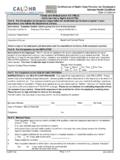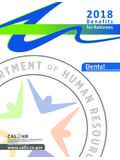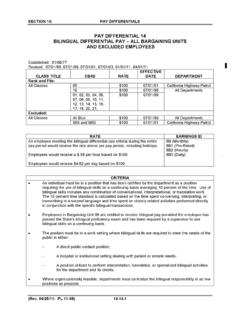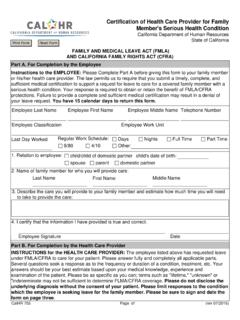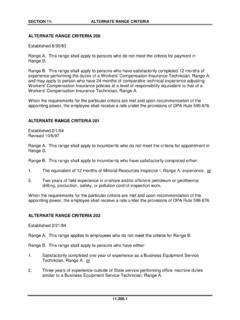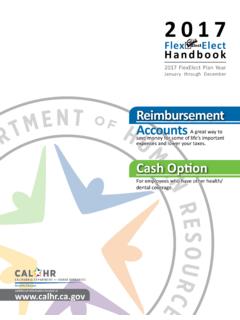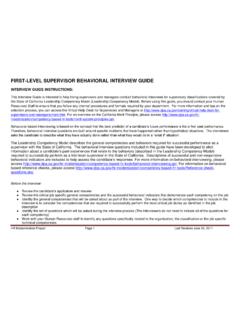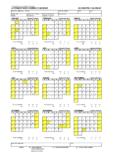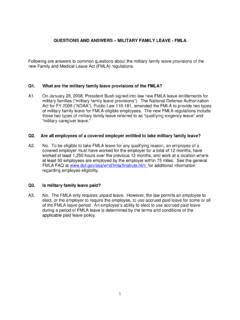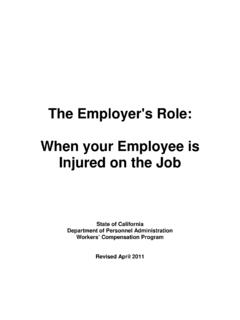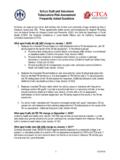Transcription of Become an Analyst for the State of California - calhr.ca.gov
1 Become an Analyst / December 2009 Become an Analyst for the State of California A guide to help you develop your Analyst skills Department of Personnel Administration HR Modernization Project ii We thank these contributors: California Department of Education Board of Equalization County of Santa Barbara iii Contents Getting started 1 If you're thinking about becoming an Analyst 1 How do I use this guide? 1 For supervisors 1 Use the employee's self- assessment 1 Tailor training to meet the employee s needs 2 Self- assessment 3 Competencies 3 Analytical Thinking 4 Customer Focus 5 Oral Communication Skills 6 Written Communication Skills 7 Interpersonal Skills 8 Organizational Awareness 9 Personal and Professional Development 10 After you take the self- assessment , it's time to talk 11 Training 12 Choose the right course 12 Beyond formal training 12 For more information 12 Training providers 12 Training curriculum by competency 14 Analytical Thinking 14 Customer Focus 18 Oral Communication 19 Written Communications 21 Interpersonal Skills 24 Organizational Awareness 26 Professional and Personal Development 27 iv Guidance for supervisors 30 How do I develop a good IDP?
2 30 Gauge the amount of guidance an employee needs 30 Talk with the employee 30 Refer to the IDP regularly 30 Evaluate performance every year 30 How can I help employees develop professionally? 30 Coach and mentor employees 30 Encourage self-development 31 Talk about training courses before and after 31 Be a good role model 31 Build the employee's relationships 31 Resources to help you give useful performance feedback 31 Guidance for employees 33 How can the IDP help me Become an Analyst ? 33 Identify the gap 33 Set your objectives 33 Make a plan 33 How can I achieve my objectives? 33 Develop yourself through training 33 Stay motivated and keep going! 34 Notes 35 1 Getting started If you're thinking about becoming an Analyst This guide will help you: Assess yourself Identify the knowledge, skills, abilities, and personal characteristics (competencies) needed to Become an Analyst Identify training to help you develop these competencies Discuss your current job performance and upward mobility with your manager Develop your career plan to Become an Analyst How do I use this guide?
3 Start by talking to your supervisor. Work together to fill out the self- assessment . Then work with your supervisor to identify the training you need. For supervisors Supervisors can use this guide to develop a career plan with the employee. We recommend you help the employee develop in ways that support your department's strategic goals. You'll find detailed advice on page 30. Use the employee's self- assessment We recommend you and your employee complete the assessment separately and then meet to discuss one another s perspectives. The self- assessment helps you discuss: Career development plans Upward mobility plans The individual development plan and the performance appraisal summary (STD 637) - PDF. (This form, completed annually, is the primary method for evaluating the skill levels of BU 4 employees.) Also see the guidance at the end of this guide. 2 Tailor training to meet the employee s needs Employees have different training needs, depending on their existing skills, knowledge, attitudes, experiences, responsibilities, and assignments.
4 They have different learning patterns and respond to different types of teaching. No single type of training will work well for everyone preparing to Become an Analyst . 3 Self- assessment The self- assessment helps clarify what's important in your current job, identify performance gaps, and show you where you need to develop. We recommend you and your supervisor complete this form separately and then meet to discuss your perspectives. Work together to develop an individual development plan or upward mobility plan. You'll find samples on page Error! Bookmark not defined. (Sample IDP) and page Error! Bookmark not defined. (sample upward mobility plan). Use these scales as you take the self- assessment : Importance to current job: Critical, medium, or low. Needs more development: High need for training and development, refresher needed, or leave blank if training and development aren't needed. Competencies This comprehensive self-evaluation identifies competencies you'll need to Become an Analyst .
5 You'll assess yourself in these key competencies: Analytical Thinking Customer Focus Oral Communication Written Communication Interpersonal Skills Organizational Awareness Professional And Personal Development For each competency, we identify performance expectations. The expectations apply to anyone wanting to Become a State Analyst . Specifically, they're consistent with the job expectations negotiated for all employees of Bargaining Unit 4 (BU 4) and Bargaining Unit 1 (BU 1). For more on competencies, see the Competency Dictionary ( ). 4 Analytical Thinking Performance Expection Importance to Current Job Needs More Development Develops and evaluates logical alternatives to solve routine problems. Analyzes data, discriminates between relevant and irrelevant data, and present ideas and information effectively. Reads routine correspondence or materials, simple charts, tables, graphs, and diagrams. Applies information to complete routine or simple tasks.
6 Visually organizes information to get a point across; determine the best way to effectively present data so it will be understood. Gathers information from one or two sources identified by others. Organizes and maintains routine information using clearly outlined guidelines. Follows up with staff work that is complete and ready for an appropriate decision. 5 Customer Focus Performance Expection Importance to Current Job Needs More Development Identifies customers and clients (internal and external) to identify what they want and to develop staff work tailored to meet their needs. Clarifies customer and client needs and resolves conflicts in priorities where they occur. Establishes and maintains rapport with customers and clients and lets them know he/she is willing to work with them to meet their needs. Solves customer problems quickly and effectively. Finds ways to measure and track customer satisfaction. 6 Oral Communication Skills Performance Expectations Importance to Current Job Needs More Development Organizes thoughts and ideas into a cogent and logical presentation.
7 Ensures that others involved in a project or effort, including the manager, is kept informed about progress and problems. Consults with and advises administrators or other interested parties on a wide variety of subject-matter areas. Listens to others and responds appropriately. Presents ideas and information effectively. Facilitates productive meetings. 7 Written Communication Skills Performance Expectation Importance to Current Job Needs More Development Effectively communicates the results of his/her work to others. Presents a logical, objective, and well-considered line of thought. Meets agency or departmental standards for grammar, punctuation, and spelling. Composes documents or correspondence involving simple or routine information. Revises and edits his/her own work and seek help when necessary. Writes for tone, brevity, and effectiveness and proofreads own work. Avoids the use of jargon and bureaucratic terminology. 8 Interpersonal Skills Perfomance Expectation Importance to Current Job Needs More Development Gains and maintains the confidence and cooperation of management, other employees, customers, or others contacted during the course of work.
8 Remains courteous when discussing information or eliciting non-sensitive or noncontroversial information from people who are willing to give it. Effectively handles situations involving little or no tension, discomfort, hostility, or distress. Anticipates how others will react to a situation. 9 Organizational Awareness Performance Expectation Importance to Current Job Needs More Development Understands principles, practices, and trends of public and business administration, management, and supportive staff services such as: Budgeting Personnel Management analysis Contracting Understands governmental functions and organization. Keeps current with issues which may have a future impact on the mission of the organization. Understands and effectively works within the organization s structure and policies. 10 Personal and Professional Development Performance Expectation Importance to Current Job Needs More Development Identifies with his/her supervisor areas where training may improve performance and enhance career goals.
9 Maintains an open feedback loop with his/her supervisor regarding performance goals. Builds on strengths and addresses weaknesses. Seeks out new learning experiences and opportunities to master new knowledge. Takes advantage of professional development opportunities. Develops an Individual Development Plan as a follow-up to the performance evaluation process. 11 After you take the self- assessment , it's time to talk Talk with your supervisor about the areas critical to your current job that also show a high need for training and development. Make these your immediate training priorities, since they help improve current performance as well as help prepare you for an Analyst position. Work together to develop an individual development plan or upward mobility plan. You'll find samples on page Error! Bookmark not defined. (Sample IDP) and page Error! Bookmark not defined. (sample upward mobility plan). 12 Training Choose the right course For each competency, we list courses that will help develop that competency.
10 We recommend you look for courses that assess knowledge and skills before and after training. That kind of assessment ensures the course is effective and that the skills are put to use back on the job. You can take many courses over the Web. The California Virtual Campus can help you find online courses in several subject areas ( ). We encourage all State employees to enhance their skill sets and career opportunities. However, time and monetary reimbursement depend on your department's operation needs and funding, and on your bargaining unit contract. Beyond formal training You can also develop your Analyst competencies through: Apprenticeships Communities of practice Expert interviews Internships Job aids Job shadowing Mentoring Storytelling Structured on-the-job training For more information Please contact Jodi Traversaro (916) 324-3860 or or Joan Strohauer (916) 558-1812 or Training providers We list only a few training providers here. Other departments, colleges, and training providers may offer the same or equivalent courses.
